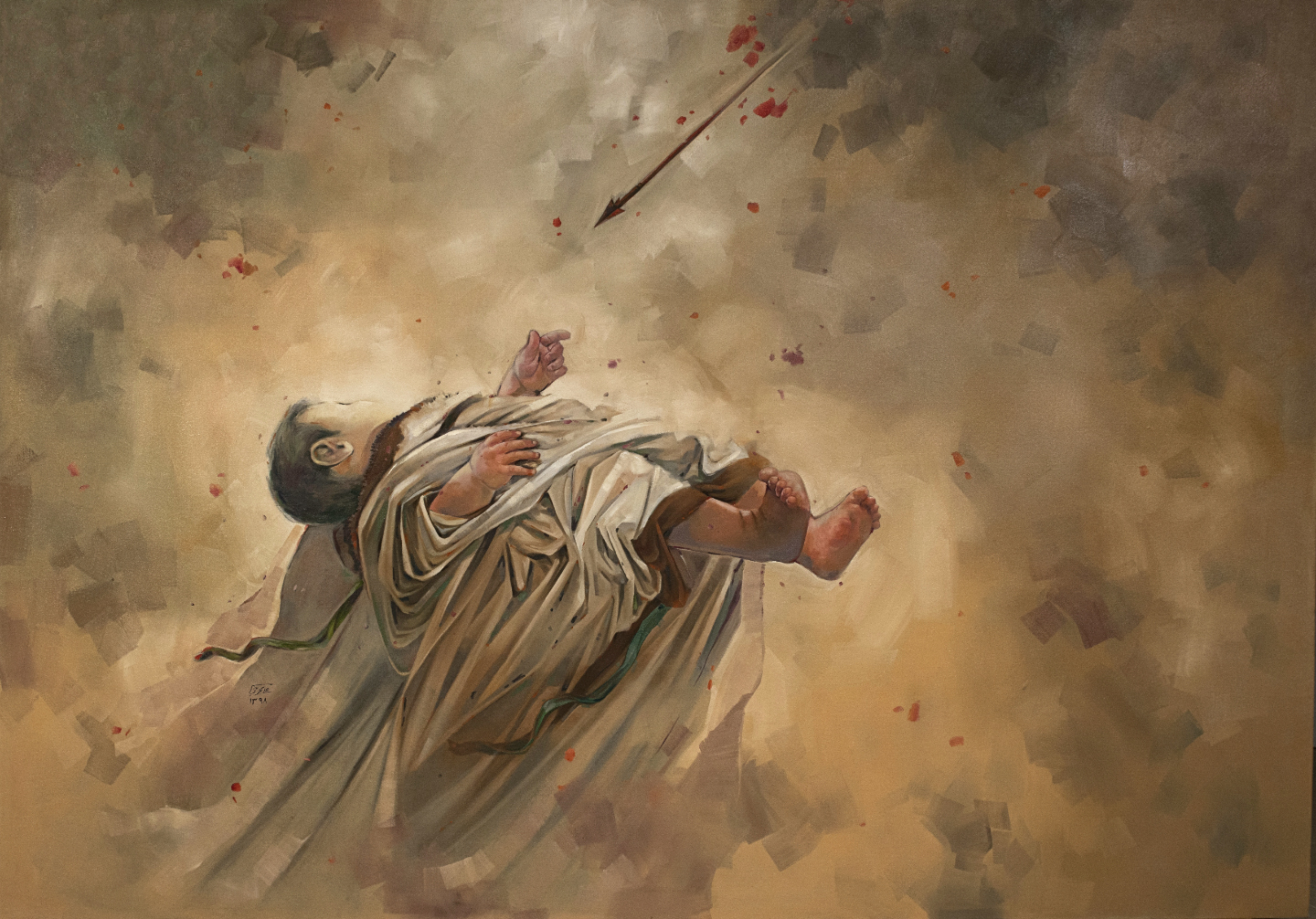He is the youngest martyr of the Battle of Karbala on the day of Ashura and has very respectable and a high position among Shi'a (and even Sunni Muslims). He is given the title "Bab al-Hawa'ij".
Birth and Lineage
Abd Allah is the youngest son of Imam al-Husayn (a). His mother was Rabab bt. Imru' al-Qays.[1]
There is no consensus on the exact date of his birth. However,
most historical references have mentioned that he was newly born when he
was martyred on the Day of Ashura (61/681).[2] He is buried in Karbala next to the tomb of Imam al-Husayn (a).
Name
Both Shi'a and Sunni
early sources have mentioned that the name of this infant was Abd
Allah; however, in later Shi'a sources, he is known as Ali al-Asgar).
The books Maqtal al-Husayn by Khwarizmi[3] and Manaqib Al Abi Talib by Ibn Shahrashub[4]
are two of the above-mentioned later Shi'a sources which have mentioned
the youngest son of Imam al-Husayn (a) as Ali. Later sources followed
them in calling This infant Ali al-Asghar (a) (especially in Persian
sources).
Martyrdom
There are different narrations about how he (a) was martyred on the Day of 'Ashura. *It is narrated that when all Imam al-Husayn's (a)
companions were martyred and before he (a) went to the battlefield, he
(a) came to the tents and embraced Ali al-Asghar and when he (a) was
kissing the child suddenly a soldier from Banu Asad tribe threw an arrow towards the child's neck and killed him. The murderer's name was Harmala b. Kahil.[5]
- Some other narrators stated that Lady Zaynab (a) brought Abd Allah to Imam al-Husayn (a) and asked for water for Abd Allah. Imam (a) took his child in the front of the army and said, "O people! You murdered my household and all my companions except this thirsty newborn child who is dying! Give him some water!" While he (a) was speaking with them, suddenly, a soldier threw an arrow towards Ali al-Asghar and made him martyred.
- The most reliable narration is quoted by Ibn al-Jawzi from Hisham b. Kalbi, who said when Imam al-Husayn (a) saw that Kufan army persisted in killing him, took the Qur'an on his head addressing them, "This book of the Qur'an and the Prophet Muhammad (s) will judge between you and me. Oh, people! How do you assume killing me lawful?"
At this time, Imam (a) saw one of his children was crying of thirst;
thus, he (a) took him on his hand and said, 'O People! If you show no
mercy to me; Have mercy on this thirsty child!" At this moment, someone
from the Kufan army threw an arrow towards Ali al-Asghar.[6]
Imam's (a) reaction
Imam al-Husayn (a) cried hard and said, "O God! Judge between the people who invited us to help and us, but they killed us!"[7]
Then, Imam al-Husayn (a) took his hand under Abd Allah's neck and, when
his hand filled with blood, threw it all up to the sky. Then, Imam
al-Husayn (a) said, "what makes all these hardships easy for me is the
fact that all of this has happened in the presence of God."[8] It is narrated from Imam al-Baqir (a) that none of that blood returned down or poured on the earth.[9]
Imam al-Husayn (a) returned the body of Ali al-Asghar to the tents for burying.
Some historians have mentioned that after the martyrdom of Ali al-Asghar (a), Imam al-Husayn (a) said, "O God! The martyrdom of this child is not less important than the martyrdom of the Camel of Salih before You![10] So, if today, You have prevented us from the victory, assign better things for us!"[11]
It is narrated that Imam al-Husayn (a) dug a grave using his sword and buried Ali al-Asghar (a).[12]
But, some historians mentioned that he (a) took the bloodstained body
back to tents and gave it to his honorable sister Zaynab (s).[13] Also, it is mentioned that Imam (a) put the body next to the bodies of other martyrs.[14]
Bab al-Hawa'ij
Many Shi'as call Ali al-Asghar (a) Bab al-Hawa'ij
[lit. Door to Invocations]. This shows that in their view, although he
was an infant at the time of martyrdom, he has a very high position
before God.
Notes
- Mufīd, al-Irshād, vol. 2, p. 135.
- Ṭabarī, Tārīkh al-umam wa l-mulūk, vol. 5, p. 448-468.
- Khwārizmī, Maqtal al-Ḥusayn, vol. 2, p. 37.
- Ibn Shahrāshūb, Manāqib Āl Abī Ṭālib, vol. 4, p. 109.
- Ṭabarī, Tārīkh al-umam wa l-mulūk, vol. 5, p. 448; Khwārizmī, Maqtal al-Ḥusayn, vol. 2, p. 37.
- Ibn al-Jawzī, Tadhkirat al-khawāṣ, p. 227.
- Ibn al-Jawzī, Tadhkirat al-khawāṣ, p. 227.
- Ibn Ṭāwūs, al-Luhūf, p. 117.
- Abī Mikhnaf, Maqtal al-Ḥusayn, p. 70.
- Maḥallātī, Farsān al-hayjāʾ, vol. 1, p. 272.
- Ṭabarī, Tārīkh al-umam wa l-mulūk, vol. 5, p. 448; Khwārizmī, Maqtal al-Ḥusayn, vol. 2, p. 37.
- Khwārizmī, Maqtal al-Ḥusayn, vol. 2, p. 37.
- Ibn Ṭāwūs, al-Luhūf, p. 117.
- Mufīd, al-Irshād, vol. 2, p. 108.
References
- Abī Mikhnaf, Lūṭ b. Yaḥyā. Waqʿat al-ṭaff. Edited by Muḥammad Hādī Yūsifī al-Gharawī. Second edition. Qom: Majmaʿ al-ʿĀlamī li-Ahl al-Byt, 1427 AH.
- Ibn al-Jawzī, Yūsuf. Tadhkirat al-khawāṣ. Qom: Manshūrāt al-Sharīf al-Raḍī, 1418 AH.
- Ibn Shahrāshūb, Muḥammad b. ʿAlī. Manāqib Āl Abī Ṭālib. Edited by Hāshim Rasūlī Maḥallātī. Qom: [n.p], [n.d].
- Ibn Ṭāwūs, ʿAlī b. Mūsā. Al-Luhūf ʿalā qatlay al-ṭufūf. Tehran: Jahān, 1348 Sh.
- Khwārizmī, Muḥammad b. Aḥmad al-. Maqtal al-Ḥusayn. Second edition. Qom: Anwār al-Hudā, 1423 AH.
- Maḥallātī, Dhabīḥ Allāh al-. Farsān al-hayjāʾ fī tarājim aṣḥāb sayyid al-shuhadāʾ. Edited by Muḥammad Shuʿāʿ Fākhir. Qom: al-Maktaba al-Ḥaydarīyya, 1386 Sh.
- Mufīd, Muḥammad b. Muḥammad al-. Al-Irshād fī maʿrifat ḥujaj Allāh ʿalā l-ʿibād. Beirut: Dār al-Mufīd, 1414 AH.
- Ṭabarī, Muḥammad b. Jarīr. Tārīkh al-umam wa l-mulūk. Second edition. Beirut: Dār al-Turāth, 1387 AH.
/129

